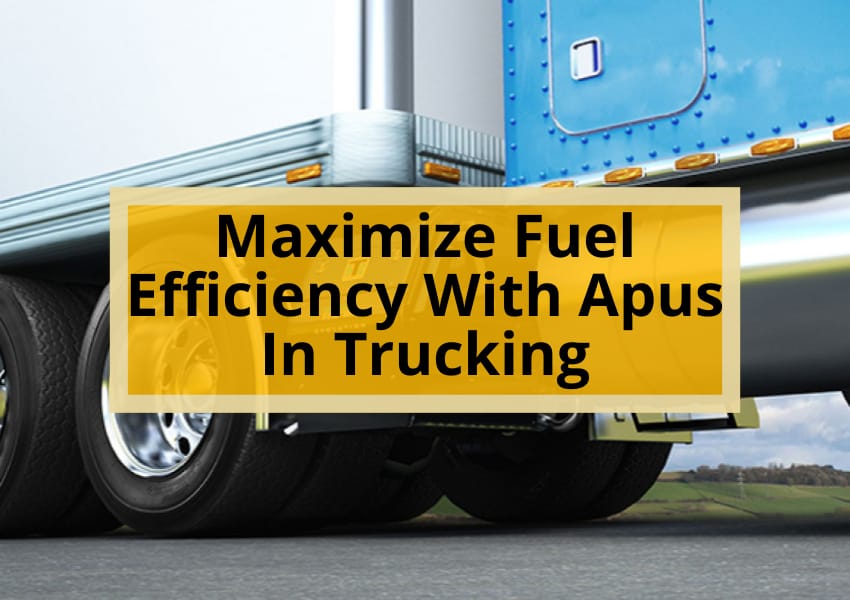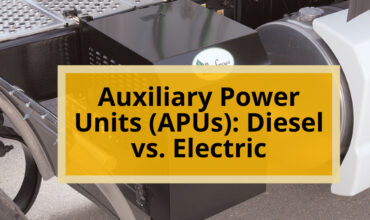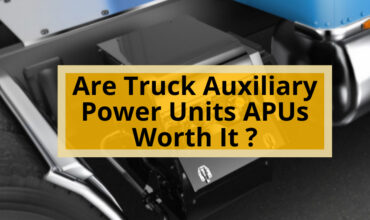The US trucking industry is a significant contributor to the country’s economy, but it also consumes a considerable amount of fuel each year. With idling being a major fuel waster for trucks, truckers are looking for energy-efficient alternatives to save money and reduce their environmental impact.
Auxiliary power units (APUs) are one such alternative that can help truckers maximize fuel efficiency. APUs are devices that provide power to appliances in a truck without the need to keep the engine running. They come in different types, including diesel and electric, and can significantly reduce fuel consumption during transit.
Installing an APU on your truck can not only improve fuel efficiency but also help comply with strict idling regulations. In this article, we will explore the different types of APUs, their benefits and savings, and the maintenance and regulations that come with using them.
By understanding the advantages and considerations of APUs, truckers can make informed decisions to maximize fuel efficiency and reduce their operational costs.

Types of APUs
In the trucking industry, auxiliary power units (APUs) are gaining popularity as an energy-efficient alternative to idling.
APUs are available in different shapes and sizes, including diesel-powered and electric-powered, adding variety to the market.
Diesel-powered APUs are the most popular type in the market due to their ability to power several appliances without the need to keep the engine running.
On the other hand, electric-powered APUs are more affordable than diesel APUs and require less upkeep.
Diesel APUs offer savings of approximately 75% in fuel consumption compared to idling, making them a cost-effective choice for truckers.
While electric APUs are more affordable, they have a limited storage capacity and may require drivers to idle their trucks to charge them in certain cases.
When considering the purchase of an APU, it is essential to weigh the cost of the device against the expected return on investment, taking into account the type, quality, brand, and other factors.
Benefits and Savings
The installation of auxiliary power units presents an economical and environmentally conscious solution to reduce fuel consumption and comply with idling regulations in the US trucking industry.
By using APUs, truckers can save up to 75% on fuel consumption compared to idling, resulting in significant cost savings. This is particularly true for diesel-powered APUs, which have a higher ROI calculation than electric-powered ones.
The cost of purchasing an APU can be high, ranging from $7,000 to $12,000, but the return on investment can be achieved within 1.6 to 4.6 years.
In addition to economic benefits, APUs also have a positive environmental impact. By reducing idling, APUs help to minimize fuel demand and ensure energy security.
Rest-period idling produces millions of tons of carbon dioxide and other pollutants annually, which can be significantly reduced by using APUs. They serve as an eco-friendly alternative to truck idling, reducing carbon footprint when transporting cargo.
This makes APUs a vital solution for truckers who are concerned about the environment and want to contribute to reducing greenhouse gas emissions.
also read : Inverters: Power Usage And Efficiency
Maintenance and Regulations
Maintenance-heavy diesel-powered APUs require regular oil changes and part replacements, while electric-powered APUs may have limited storage capacity and require idling the truck to charge, all in accordance with strict state regulations aimed at minimizing pollution and ensuring energy security.
The maintenance of APUs is essential to ensure their optimal performance and longevity. Diesel APUs require more maintenance than electric APUs due to the complexity of their engines and the need to change oil and filters regularly. Moreover, drivers should be aware of the state regulations related to APUs to avoid fines and penalties for noncompliance.
Regulatory compliance is a crucial aspect of APU maintenance, as states impose different rules and restrictions on idling and emissions. Besides, APUs’ costs can increase significantly due to repairs and replacements, which should be considered when calculating the return on investment of APUs.
Therefore, truckers should select the appropriate APU type for their needs and environmental conditions, considering the upfront and maintenance costs, weight limitations, and state regulations. By following these guidelines, truckers can benefit from APUs’ fuel-saving advantages while complying with state regulations and reducing their environmental impact.
Frequently Asked Questions
What is the lifespan of an APU and how often does it need to be replaced?
The lifespan of an APU varies depending on usage and maintenance. Regular APU maintenance, such as oil changes and part replacements, can increase its longevity. APU cost effectiveness should be considered when deciding whether to replace or repair an APU.
Can APUs be used in all types of trucks or are they only compatible with specific models?
Compatibility concerns and installation challenges may arise when installing APUs in certain truck models. It is essential to consider environmental conditions, state regulations, and maintenance costs before purchasing an APU. Expert advice and research can help minimize these challenges.
Are there any tax incentives or rebates available for truckers who invest in APUs?
Truckers investing in APUs may qualify for tax incentives and rebates. Fuel savings from APUs can result in a positive ROI. These incentives vary by state, and truckers should research them before investing in APUs.
How do APUs affect the resale value of a truck?
The presence of an APU may increase the resale value of a truck due to its impact on fuel savings and lower maintenance costs. However, other factors such as age, mileage, and overall condition also play a significant role.
What are the noise levels of APUs and do they cause any disturbance in residential areas or truck stops?
APUs can produce noise levels between 50-70 decibels, which is similar to a normal conversation. However, if not maintained properly, they can create a disturbance in residential areas. APUs with noise-reducing features can be a solution to minimize noise pollution.






